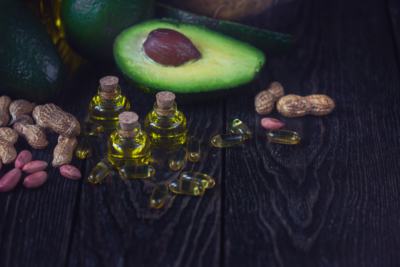Conventional medicine is slowly admitting that instead of fat, sugar and refined carbohydrates are the biggest sources of high cholesterol and inflammation.
 Excess sugars and carbs drive good cholesterol down and triglycerides up, leading to the small, dangerous particles that encourage plaque buildup in the arteries. This contributes to heart disease and insulin resistance, or pre-diabetes, which are the enemies of successful Hashimoto’s hypothyroidism management.
Excess sugars and carbs drive good cholesterol down and triglycerides up, leading to the small, dangerous particles that encourage plaque buildup in the arteries. This contributes to heart disease and insulin resistance, or pre-diabetes, which are the enemies of successful Hashimoto’s hypothyroidism management.
High blood sugar and insulin levels drive chronic systemic inflammation, playing a large role in heart disease and most other chronic illnesses, including autoimmune diseases such as Hashimoto’s hypothyroidism. Systemic inflammation arises not only from poor diet, but also from an inactive lifestyle, chronic stress, food sensitivities, chronic viral and bacterial infections, and more.
Recently busted cholesterol myths that also affect your Hashimoto’s hypothyroidism include:
- Statins: Recent research shows that statin benefits are likely due to their ability to lower inflammation, not cholesterol.
- Heart attack: 75 percent of those who have heart attacks have normal cholesterol levels.
- Age: In older patients, those with higher cholesterol have a lower risk of death than those with lower levels of cholesterol.
- Harvard research has shown that a high level of systemic inflammation ranks higher than high cholesterol for putting subjects at risk for heart disease.
Consume plenty of fats from healthy sources in your Hashimoto’s hypothyroidism protocol
Conventional medicine has touted a low-fat diet for years, but researchers and doctors are coming to realize we need more fat in our diet than previously thought. However, not all dietary sources of cholesterol are created equal. The type of fat you consume matters more than the quantity when managing Hashimoto’s hypothyroidism.
For your thyroid health, it’s important to consume plenty of healthy, unprocessed fats and avoid processed vegetable oils. Avoid all trans fats as they raise your risk of cardiovascular disease and can damage your brain.
Omega 3 and monounsaturated fats improve the type of cholesterol in our bodies.
The dietary reference intake (DRI) for fat in adults is 20 percent to 35 percent of total calories from fat. That equals about 44 to 77 grams of fat per day for a 2,000 calorie diet. The ratio changes if you are following a low-carb or ketogenic diet.
Below are the recommended consumption ratios for conventional diets:
- Monounsaturated fat: 15 percent to 20 percent
- Polyunsaturated fat: 5 percent to 10 percent
- Saturated fat: less than 10 percent (unless keto)
- Trans fat: 0 percent
- Cholesterol: less than 300 mg per day
Unsaturated fats. Typically liquid at room temperature, sources include monounsaturated and polyunsaturated. When used in place of saturated fat, monounsaturated and polyunsaturated fats can lower cholesterol levels.
Monounsaturated fats. Healthy versions come from plant-based sources such as nuts, olives, and avocado. Avoid canola oil.
Polyunsaturated fats. Healthy plant-based sources include nuts. Avoid processed seed and grain (corn) oils due to frequent rancidity.
Omega-3 fatty acids are polyunsaturated fats that help lower inflammation. Good sources include cold water fish (salmon, tuna, herring, and anchovies), flax and chia seed, and walnuts. These are important for helping manage the inflammation associated with Hashimoto’s hypothyroidism.
*Saturated fats. Typically solid or waxy at room temperature, these come from animal products and tropical oils. Taking in too much saturated fat is linked with raising levels of “bad” LDL cholesterol in the blood and increasing internal inflammation. Healthy foods high in saturated fat include:
- Beef, pork, lamb, veal, and skin of poultry
- High fat dairy products
- Butter, lard, and bacon fat
- Palm, palm kernel, and coconut oil
*Low-carb and ketogenic diets: The rules on fat ratios change on diets that are very carb-restricted due to how carb levels affect saturated fat in the bloodstream. People on these diets are able to consume higher ratios of saturated fats safely. Many people find low-carb or ketogenic diets help them better manage Hashimoto’s hypothyroidism.
Trans fats form when a liquid fat is changed into a solid fat through a process called hydrogenation. This extends shelf life, however trans fats raise levels of “bad” LDL cholesterol and decrease levels of “good” HDL cholesterol.
Avoid trans fats completely! Sources of trans fat include solid margarine, shortening, powdered and liquid creamers, and most convenience and prepackaged foods.
Ask my office for more advice on how much and what types of fats to eat in your diet in order to better manage your Hashimoto’s hypothyroidism.





